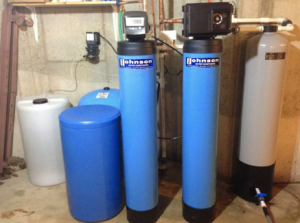Everything You Need to Know About Chemical Injection Systems: Perspective from a Plainfield Water Conditioning and Water Softening Company
 In general, homes get their water from one of two sources: municipal water supplies and wells. While both municipal and well water are filled with their fair share of contaminants, well water generally contains contaminants that don’t exist in municipal water.
In general, homes get their water from one of two sources: municipal water supplies and wells. While both municipal and well water are filled with their fair share of contaminants, well water generally contains contaminants that don’t exist in municipal water.
As such, in order to purify well water, you must use additional purification methods and systems. In particular, you must use a chemical injection system. Below, we’re going to get into the specifics of chemical injection systems, discussing their types, their benefits, and a variety of other information.
Types of Chemical Injection Systems
There are a number of different types of chemical injection systems, each of which provides something a little different in terms of benefits and functionality. However, the two most prominent of these systems are the hydrogen peroxide and chlorine injection systems. Below, we’re going to get into the specifics of both.
Hydrogen Peroxide Injection System
Hydrogen peroxide injection systems utilize hydrogen peroxide in order to neutralize iron, manganese, hydrogen sulfide, and bacteria in water. In doing so, they eliminate poor tastes, poor smells, and water staining capabilities.
Often times, these systems will be equipped with flow switches, allowing you the option to purify all of the water on your property, or only the water that flows into your home. This capability can help you to save money over time.
Chlorine Injection System
Chlorine injection systems operate in a way that is similar to hydrogen peroxide injection systems. This is to say that they pump chlorine into water over time, allowing it to neutralize iron, manganese, hydrogen sulfide, and, of course, bacteria.
The difference between these systems lies in the way that they neutralize these contaminants. Whereas hydrogen peroxide injection systems create a hydroxide floc after meeting with iron, chlorine injection systems create rust after meeting with iron. However, in the end, they produce almost the same result, as both systems then use filters to rid the water of their respective created compounds.
One last thing to note is that, while hydrogen peroxide systems leave no hydrogen peroxide in water after the purification process, chlorine injection systems do leave small traces of chlorine. As such, they can produce slightly different tastes.
How Does a Chemical Injection System Work?
Now, you might be wondering how a chemical injection system works. For the most part, chemical injection systems are straightforward devices.
Put simply, these systems pump chemicals into water supplies, using these chemicals to neutralize specific contaminants existing within those water supplies. In doing so, they provide numerous benefits, including pure tastes, pleasant smells, and reduced water staining.
When is a Chemical Injection System Necessary?
Chemical injection systems are necessary in scenarios where water has not already been treated by a higher authority. In other words, they’re needed by those who get their water from a private supply.
Well owners are the most common users of chemical injection systems, as they need a system to neutralize the unique minerals and bacteria that exist within their wells. Because their surrounding municipalities don’t treat their well water for them, they must use chemical injection systems to do it themselves.
Utilize the Services of a Plainfield Water Conditioning Company
Are you interested in installing a chemical injection system? Looking to utilize the services of a Plainfield water conditioning company? If so, Johnson Water Conditioning has you covered.
Our team has installed chemical injection systems in countless Plainfield homes. Whether you’re looking to install a chlorine injection system or a hydrogen peroxide injection system, we can accommodate you.
Contact us today to schedule an appointment!

 Better Water for
a Better Life
Better Water for
a Better Life
